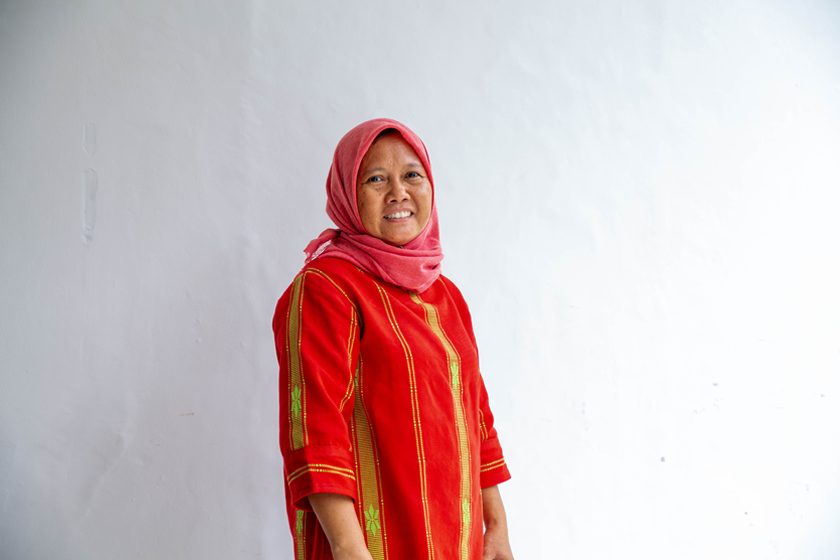Winner of the 2021 Promoting Women’s Empowerment and Social Inclusion Award
“I am used to receiving death threats … I have crossed jungles and the ocean just to survive and I managed to stay alive. So those threats are nothing new to me.” Her words are peppered with laughter, but Siti Badriyah knows there is a side to protecting workers’ rights that cannot be taken lightly.
Born in Mrayun, a small village in Central Java’s Grobogan Regency, Siti started working in a garment factory in Semarang after graduating high school in 1994. Similar work took her to Bekasi’s Cikarang and when her parents asked her to come home and get married, she obeyed.
But not long after her daughter was born, Siti became a victim of domestic violence. She ended her marriage and knew she had to make a living to support her child. At the time, agency brokers swarmed villages to find would-be migrant workers to work overseas as domestic helpers.
“I signed an agreement that would send me to Malaysia and I only brought my identity card,” Siti said, recalling the events of late 2001.
But she soon found out the work was not what was promised. Over the course of 10 months, Siti was transferred from one employer to the next as a domestic helper who also helped in their businesses, ranging from a minimarket to a pipe factory.
There were five employers in total, she said, and during those months she never received any wages. She then learned that her salary was paid to the agency, which later said she would receive it after two years.
“With all the uncertainty, I fled and ran to a mosque, whose keeper helped to find a paying job in a factory’s cafeteria,” Siti said. She was determined to go home after she had enough money, but her lack of documentation meant she was not able to leave the country legally. She joined a group of people that cut across a mangrove forest in Johor and continued to a port in Riau to be smuggled on a boat to Java.
It was then that Siti found out about Migrant Care, an NGO based in Jakarta aiming to protect Indonesian migrant workers. “Often there was no one when I arrived at their office, as employees were out with workers who needed help,” Siti recalled of the first few times she visited Migrant Care in 2004.
Based on their shared experiences, including being exploited by agencies or employers, she became acquainted with fellow migrant workers who came looking for assistance and felt the urge to help.
“They were mostly women who came by themselves,” said Siti, who then joined the NGO and accompanied workers to relevant institutions, such as the Ministry of Manpower, or recruitment agencies. At times, out of fear that their fraudulent practices such as trafficking and wage theft would be exposed, agencies would send death threats to Siti.
Four years later, she transferred to Migrant Care’s Advocacy and Policy department, where she began to advocate for the new Law on the Protection of Indonesian Migrant Workers that would provide better protection. She worked closely with members of parliament from 2010 until the law was finally passed in 2017.
During this period, in 2015, Siti attended the Australia Awards’ Organisational Leadership and Managing Practice for Non-Government Organisations short course at the University of Sydney, an experience that was particularly enriching.
“I gained so much insight, especially from Professor Michelle Ford who was an excellent motivator,” she shared. “The lesson that stuck with me is to never feel afraid to move forward as leaders, even with obstacles ahead and even though we sometimes feel discouraged. At the end of the course, I felt more confident in speaking up. I put this into practice when I spoke to members of the House. I had more faith in myself.”
Over the seven years the law was before the House of Representatives, Siti was tireless in her advocacy to parliament members. She visited to check on the progress so frequently that she knew which hallways were unguarded by security officers. She attended private meetings held by the members.
“Sharing the experiences of migrant workers made the members more conscious of the problems and in turn, they became more compassionate,” she said.
Siti’s unfaltering efforts began to pay off when the workers she was supporting realised the magnitude of their cases.
“Solving a case is never easy,” she said. “It takes time and money, and workers would realise they needed to be more cautious in the future. Then they could properly inform their friends and neighbours about the risks of becoming a migrant worker. Some have even become companions to workers in trouble in their regions.”
An initiative started in 2015 by Migrant Care along with Program MAMPU, a partnership between Australia and Indonesia for gender equality and women’s empowerment, has furthered the endeavour to protect migrant workers.
Found in 37 villages across Java as well as West Nusa Tenggara and East Nusa Tenggara, Villages Caring for Migrant Workers (Desa Peduli Buruh Migran/Desbumi) are supported by the local governments to provide services and protection for migrant workers, with the aim of boosting their economic empowerment. For instance, former migrant workers are encouraged to make use of the abundant resources in their regions and turn them into consumer goods.
Now as the Policy Advocacy Coordinator for Migrant Care, Siti is enrolled in another Australia Awards’ short course, Human Rights Leadership to Influence Policy at the University of New South Wales. Siti has vowed to do whatever she can to help migrant workers, especially women.
“Women’s positions in society are often undermined but women must stay strong, independent and unaffected,” she said. “I was a victim of abuse, I put my life on the line and I wouldn’t listen to what people said about me. Don’t acknowledge the people who belittle you. Tell yourself that you are capable and strong.”


 Determined to Provide Better Protection for Migrant Workers, Siti Badriyah Forges Ahead
Determined to Provide Better Protection for Migrant Workers, Siti Badriyah Forges Ahead
